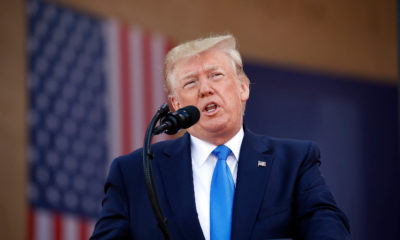World
Clinton, Trump remains unfavorable nationally: Poll
Washington: Both US’ presumptive presidential nominees Hillary Clinton and Donald Trump are gaining steam among their own parties, but remain unfavorable nationally, a poll issued on Monday found.
According to the poll conducted by research-based, global performance-management firm Gallup, since clinching the Democratic nomination earlier this month, Clinton’s favourable rating among Democrats and Democratic-leaning independents has been up slightly to 71 per cent, compared with 68 per cent in April and May, Xinhua news agency reported.
At the same time, Trump’s favourable rating among Republicans averaged to 64 per cent in June, the same as in May but higher than the 54 per cent to 56 per cent in the three prior months, the poll found.
Despite steady or even sagging ratings nationally, Trump and Clinton have begun the process of repairing their images within their own parties as they prepare to officially receive their nominations at their respective conventions in July, it said.
While Clinton may have earned a bump from clinching the Democratic nomination, she has not built on that in the following weeks, perhaps because of her rival Vermont Senator Bernie Sanders’ reluctance to withdraw from the race.
Trump, on the other hand, has picked up some additional steam among Republicans in June. It will be important to see if Trump can hold or build on his improved status among Republicans into July, the poll said.
Still, Clinton and Trump, who are the least favourable presidential candidates in decades, have each lost ground among independents who lean toward neither party.
Because of this, the candidates’ national favourable ratings have stayed still or declined slightly, despite recent improved ratings from their own parties, it said.
Clinton’s overall favourable rating since clinching the nomination has averaged 41 per cent, nearly matching her 40 per cent in May but down slightly from 44 per cent in January.
Trump’s average 31 per cent thus far in June compares with 32 per cent in May and 34 per cent in January.
World
Lockdowns in China Force Urban Communities to Defy Censorship and Vent Frustration Online

Shanghai’s rich middle class is leading a wave of online dissent over the strict and prolonged lockdowns imposed in various parts of the country. Chinese internet censorship is struggling as patience is wearing thin in many urban centers, coming up with creative forms of online protests.
Social Media Posts Revealing Lockdown Tension in Shanghai
Drawn-out lockdowns are nothing new in China as authorities insist with the nation’s zero-Covid policy since the start of the pandemic. Currently over This time around, however, metropolitan areas like Shanghai are increasingly difficult to keep quiet, given that its more than 25 million residents have seen weeks of total isolation along with food shortages and many other service interruptions.
Dozens of towns and reportedly over 300 million Chinese citizens have been affected by lockdowns of different severity. As expected, urban netizens have been most outspoken over their difficulties by finding creative ways to get around state censorship and bans placed on topics, news comments and spontaneous campaigns.
Shanghai residents have been using mobile proxies and hijacking seemingly unrelated hashtags to talk about healthcare issues, delivery failures and the overall severity of their situation. The “positive energy” that the Chinese government wants to transmit during the recent prolonged series of lockdowns does not come naturally to those counting food supplies and online censors are working hard to filter words, trending topics and undesired social media sharing.
WeChat groups and message threads are under constant monitoring. Posts questioning the zero-Covid approach have been quickly deleted, including by leading Chinese health experts like Dr. Zhong Nanshan. Video footage is soon censored and protests and investigations are quickly made to disappear.
Where this has not worked, officials have exposed banners with warnings and outright threats like “watch your own mouth or face punishment”, while drones have been patrolling the city skies. Yet, if anything, this has led to further tensions and unspoken confrontation with Shanghai’s educated and affluent middle class.
Creative Online Solutions Harnessing Civic Energy
Announcements by Chinese social media that they would be publishing the IP addresses of users who “spread rumors” have not helped either. Tech industry research has shown that much of Asia’s tech-savvy population has a habit of using mobile proxies and other privacy tools, quickly finding workarounds to browse the internet freely and talk to the world about the hottest topics.
The sheer volume of forbidden posts is already a challenge for the very censorship system, experts explain. Unable to track all trending hashtags, state workers overlook topics that speak about the US, Ukraine or other popular news. Linking human rights elsewhere to their situation, Chinese online dissidents establish their informal channels and “hijack” the conversation to share personal or publicly relevant information about the Covid suppression in their town.
Sarcastic and satirical posts still dominate. Others hope to evade the censors by replacing words from famous poems or the national anthem. One thing is certain – social media, when harnessed with the right creativity, has proven its ability to mount pressure on the government in even some of the most strictly controlled tech environments like China.
























